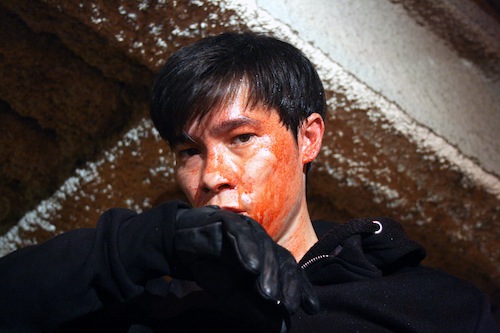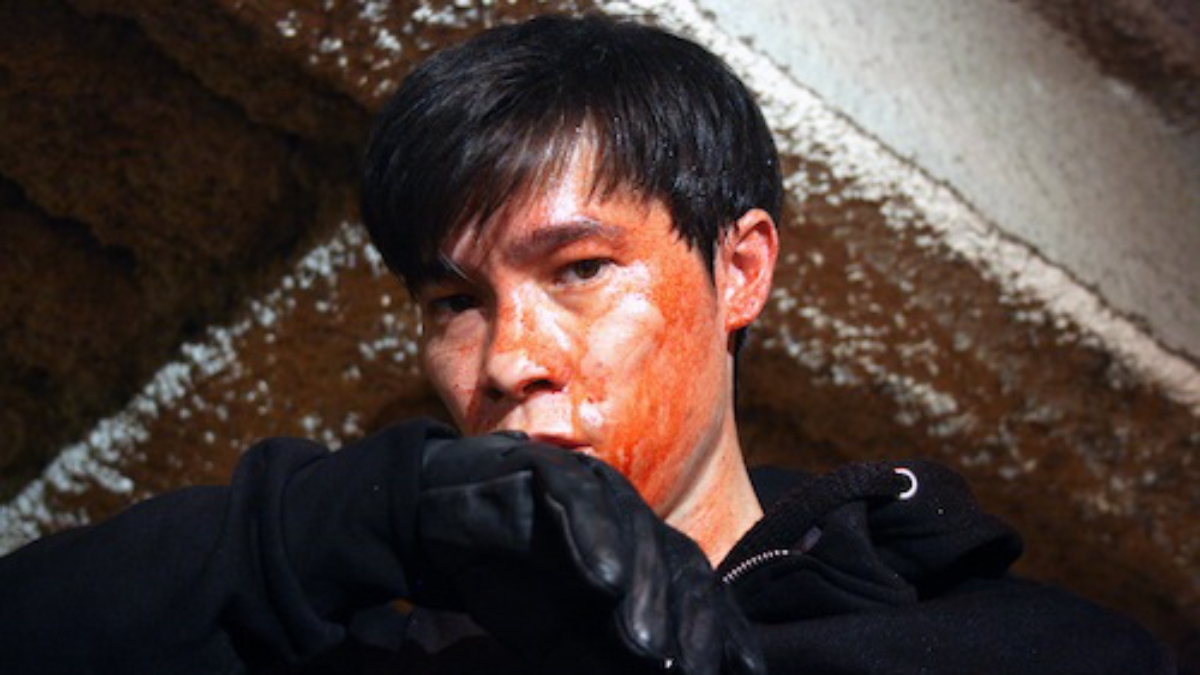
In an exploration of the consequences of long-term internalized self-hate, CHINK shows one Asian American man’s exploitation of the model minority assumption to exert his frustration with his heritage. In this interview with CineVue, screenwriter Koji SAKAI (who also wrote THE PEOPLE I’VE SLEPT WITH, screened at AAIFF in 2010) tells us about his motives for creating a film that has successfully stirred up much conversation and debate about what it means to be Asian in America.
CineVue: As a purveyor of meaning, a writer, a filmmaker, etc., creates from a very specific social context and position that shapes how and why a story, an experience, is heard and told. What inspired and motivated you to tell this story, to imagine and write Chink and its characters?
Koji Sakai: First, I love serial killers. That sounds bad. I should say that I am fascinated by serial killers. I find them interesting characters that I like to study. Also from the very beginning, Quentin Lee (the producer), Stanley Yung (the director/producer), and myself talked about doing two movies: One with an Asian American female lead and one with an Asian American male lead. We didn’t want to do a traditional Asian American movie though; we wanted to push the boundaries of Asian American stories and characters. THE PEOPLE I’VE SLEPT WITH was the female story and CHINK is the male story.
CV: As with Eddy – whose resolve was to emulate an assortment of serial killers – such as Ted Bundy, etc., were you emulating anyone in particular when you wrote Chink – especially when you wanted to add the racial spin? Eddy has a very complex psyche – that he toes a fine line between an aspiring masochist and a passive/defensive sadist; internalizing the discrimination becomes his biggest protest. What’s your bottom line there creating this character, if you don’t mind sharing with us?
KS: Originally, Eddy was modeled after Ted Bundy. Bundy was the stereotypical serial killer—good looking, smart, savvy, etc. However, as I did more research it became clear that the reality of Ted Bundy (and most other serial killers) was much different. They aren’t as smart or savvy as they are made out to be. Mostly they are just insane. When I saw the dichotomy between Bundy’s public persona and who he really was, it made sense that Eddy should embody that dichotomy. And when you stir in race and how that affects people’s perceptions of themselves, it becomes even more interesting.
CV: We see in Django Unchained, for example, the killing spree is still safely nested in the cause of restoring justice. But CHINK is more disturbing, as the victimizer takes advantage of the model minority stereotype, which is often part of the discourse of victimhood in the WASP society. We in the office were discussing – it is definitely not okay if it is made by non-Asians, but why should it be okay now that it is? Probably it is a problem of being self-reflective?
KS: This a tough question. I’ll try my best to answer it. There are two things going on here. Chink is a story about a self-hating Asian American who uses the model minority myth to his advantage. The self-hate is something we (as filmmakers) wanted to bring up. I think all people can relate to self-hate, but this is especially true for people of color. Eddy’s self-hate leads him to see the fact that the model minority stereotype might not necessarily be a bad thing. He realizes that it could help him become a better serial killer—because no one would suspect him. CHINK isn’t the first movie (or the last) to show Asian Americans taking “advantage” of the myth (BETTER LUCK TOMORROW immediately comes to mind).
http://www.youtube.com/watch?v=sqayRlkXun4
Trailer: CHINK
CV: The deployment of the racially derogatory term in your film’s title is undoubtedly contentious. How do you negotiate the usage of that term and what message do you hope viewers will get from it? Why is it important to provoke? What have been the debates so far? The project had a very successful crowd funding campaign. What kind of need is it behind this excitement?
KS: Calling a movie CHINK has led to some uncomfortable moments. One that immediately comes to mind is at my child’s day care. One of the teachers asked me the title of my newest film and when I told her “Chink” the conversation was over. But that’s what we wanted to do. We wanted to push people’s buttons and get people talking about the movie. And it worked. We’ve offended some people off in the community (and outside of the community), one Asian Pacific American group even wrote us a letter to protest the title. This is exactly what we wanted. We want a debate. We want people to talk about race, about self-hate, and about the model minority myth. And we want people talking about the film itself. I think people are always surprised though that the film is funny (you have permission to laugh) and that it doesn’t take itself too seriously!
CV: Asian America is an oft forgotten, albeit growing, community with expanding economic power. As communities of color acquire and appropriate the means of media production, what do you envision as possible futures for Asian/Asian American-made cultural products? And CHINK is definitely an attempt to break out the conventional genres associated with Asian/Asian Americans. What more can be done?
KS: I’m tired of seeing the same old Asian American movies being made. We need the creative freedom to tell a variety of stories. Not all of them are going to be pretty and show Asian Americans in the best light but that’s okay. Asian American creators (whether in TV, film, YouTube, etc.) need to stretch ourselves as much as possible. That’s the only way we are going to grow as artists and as a people. And on the flip side, we as artists and as fans need to continue to support film festivals and organizations like the Asian American International Film Festival and Asian CineVision. I am firm believer that places like AAIFF and ACV are the only places Asian American filmmakers can hone their crafts and engage in dialogue with other Asian Americans.
CV: What are your future plans? Do you have any upcoming projects that people should keep an eye out for?
KS: I’m always working on a bunch of projects/scripts. I’m an optimist so I’m planning for all of them to get made some day—sooner than later hopefully! I do have a family Christmas movie coming out this fall called, MONSTERS & ME. It will be released after Thanksgiving this year. Here is a trailer of the film: http://www.youtube.com/watch?v=_wp4XKjtcvg

